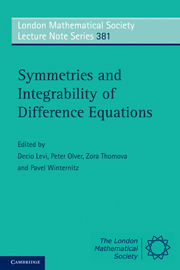Book contents
- Frontmatter
- Contents
- List of figures
- List of contributors
- Preface
- Introduction
- 1 Lagrangian and Hamiltonian Formalism for Discrete Equations: Symmetries and First Integrals
- 2 Painlevé Equations: Continuous, Discrete and Ultradiscrete
- 3 Definitions and Predictions of Integrability for Difference Equations
- 4 Orthogonal Polynomials, their Recursions, and Functional Equations
- 5 Discrete Painlevé Equations and Orthogonal Polynomials
- 6 Generalized Lie Symmetries for Difference Equations
- 7 Four Lectures on Discrete Systems
- 8 Lectures on Moving Frames
- 9 Lattices of Compact Semisimple Lie Groups
- 10 Lectures on Discrete Differential Geometry
- 11 Symmetry Preserving Discretization of Differential Equations and Lie Point Symmetries of Differential-Difference Equations
- References
2 - Painlevé Equations: Continuous, Discrete and Ultradiscrete
Published online by Cambridge University Press: 05 July 2011
- Frontmatter
- Contents
- List of figures
- List of contributors
- Preface
- Introduction
- 1 Lagrangian and Hamiltonian Formalism for Discrete Equations: Symmetries and First Integrals
- 2 Painlevé Equations: Continuous, Discrete and Ultradiscrete
- 3 Definitions and Predictions of Integrability for Difference Equations
- 4 Orthogonal Polynomials, their Recursions, and Functional Equations
- 5 Discrete Painlevé Equations and Orthogonal Polynomials
- 6 Generalized Lie Symmetries for Difference Equations
- 7 Four Lectures on Discrete Systems
- 8 Lectures on Moving Frames
- 9 Lattices of Compact Semisimple Lie Groups
- 10 Lectures on Discrete Differential Geometry
- 11 Symmetry Preserving Discretization of Differential Equations and Lie Point Symmetries of Differential-Difference Equations
- References
Summary
Abstract
We present a derivation of the continuous and discrete Painlevé equations and then proceed to establish a parallel between the special properties these equations possess, and which are related to their integrable character. The ultradiscrete forms of Painlevé equations are then derived and we show that their properties follow closely the ones of their continuous and discrete counterparts.
Introduction
Deriving integrable systems is a (very) delicate business. In the absence of a general, constructive theory the usual approach to discovering new integrable equations is to try to construct specific examples. Sometimes they are suggested by physical models, the KdV equation being the prototype of such a system. Once a sufficient number of examples are obtained one can formulate conjectures and proceed to propose integrability criteria. Painlevé equations are a minor exception to this approach. Their discovery is due to the inspired intuition of Painlevé [23]. He was faced with the problem of defining new functions from the solutions of differential equations, a challenge set by Picard [25], who thought that this would have been impossible for second-order equations. This pessimistic attitude was due to the fact that nonlinear differential equations possess multivaluedness-inducing singularities, the position of which depends on the initial conditions, thus making impossible any uniformisation treatment. The masterful solution of Painlevé was to look only for equations free of these “bad” singularities.
- Type
- Chapter
- Information
- Symmetries and Integrability of Difference Equations , pp. 50 - 82Publisher: Cambridge University PressPrint publication year: 2011

